unit1-6
人教版英语7年级下册Unit 1-6复习试题

Unit 1-6复习试题一.完形填空.Erica wants to go fishing in the sea. But Dad says, “It’s dangerous.”“But I am good 1swimming!” Erica says unhappily.“You often ask me to do2 things. And you also say that’s an important3for me to grow (成长) inside.”“But 4 a new thing can be dangerous,” Dad answers.Erica says, “Benny goes fishing all the time. I can go with him!”Dad says, “Benny is strong, but you are not.”Erica says nothing, but in the next few weeks, she keeps 5swimming. She wants to 6Dad that she can also be strong.One day, Erica asks Benny to have a 7in the swimming pool. And she also asks her dad to come to 8.To Dad’s surprise, Erica gets to the end (末端) of the pool 9.After the race is over, Dad says, “You’re right, dear! You can look after yourself on a boat, or other places.”Two days later, Erica’s dream 10—she is also on a boat heading out to the sea.1. A.with B.to C.at D.for2.A.old B.new C.boring D.cute3.A.way B.book C.card D.price4.A.seldom B.sometimes C.never D.always5.A.studying B.stopping C.practicing D.starting6.A.follow B.teach C.call D.show7.A.race B.lesson C.walk D.ride8.A.listen B.watch C.look D.move9.A.first B.second C.next st10.A.gets lost B.looks up C.makes sure es true二.阅读理解.A baboons(狒狒) live in Africa..They are like monkeys. Most people think daddy baboons don’t know their babies. But scientists(科学家)find that daddy baboons know how to help their babies. The daddy baboons are smart. Joan Silk is a scientist. She studies the baboons for 3 years. Shesays the daddy baboons are happy to see their babies. They have big teeth to help the babies to eat hard things. Mother baboons are small. And they all live in a place. When a mother baboon gives birth (分娩),she often has only one baby. Baby baboons have fur(毛皮).They are very cute. During the day, they play and eat things. At night,they sleep in the trees. Most children like baboons because they look like man.1.Where do baboons live?A.In Africa.B.In America.C.In Canada.D.In China.2.How are daddy baboons?A.They're shy.B.They're beautiful.C.They're clever.D.They're friendly.3.The underlined word “hard” means _____in Chinese.A.困难的B.容易的C.柔软的D.坚硬的4.The mother baboon usually has ________baby baboon(s) when she gives birth.A.oneB.twoC.threeD.four5.Which of the following is TRUE?A. Baboons are small monkeys.B. Baby baboons are very cute.C.Most children don't like baboons.D. Daddy baboons don't know how to help their babies.(B)Tony loves his grandma. She often tells him stories about Santa Claus (圣诞老人).Today is December 24th.Tony’s grandma takes him to Kevin’s Store to shop. She gives Tony fifty dollars and says, “Take the money and buy something for someone who needs it. I’ll wait for you in the car.”Tony thinks of everyone he knows: his family, friends and classmates. Then he thinks of Bobbie. Bobbie sits behind Tony. He doesn’t have a warm coat. Tony knows it because Bobbie never goes out to play in winter. So Tony buys a blue coat for him. It looks really warm.In the evening, his grandma helps Tony put the coat in a Christmas box, and writes “To Bobbie, From Santa Claus” on it. “Santa helps people but never lets them know,” Tony’s grandma says. They put the box in front of Bobbie’s house and then go back home joyfully.That night Tony knows Santa Claus is real, and they are on his team.6.Why does Tony buy Bobbie a warm coat?A.Because Tony has lots of money.B.Because Bobbie sits behind Tony.C.Because Bobbie doesn’t have one.D.Because Bobbie’s coat is too small.7..What is Tony like? A.Strict. B.Kind. C.Busy. D.Fun.8.What does the underlined word “joyfully” mean in Chinese?A.遗憾地B.懊悔地C.高兴地D.难过地9.What does the passage want to tell us?A.Santa Claus is busy.B.Everyone loves Santa Claus.C.There is no Santa Claus at all.D.Everyone can be Santa Claus.(C) Hello! My name is Alice. I have a great family. We all like music very much. Jenny is my mother. She is a great musician. She is good at playing the violin. She can also play the piano. She likes to sing and she can sing well. My father Tony is a teacher. He can’t play any instruments, but he likes music. He thinks it’s relaxing. When my mother plays the piano, he always listens to it.I like to play the guitar. It’s difficult at first, but I play it every day. So I can play it very well now. But my brother Bill can’t play the guitar. He thinks it’s boring. I want to teach him to play the guitar, but he doesn’t want to learn. He only likes to sing. He thinks it’s interesting.10.What does Alice’s mother do? A.A musician. B.A singer. C.A teacher. D.A player.11.How can Alice play the guitar very well?A.She learns a lot from her father.B.She has a talent for it.C.She practices playing it every day.D.She goes to a guitar lesson every day.12.What does Bill think of singing? A.Relaxing. B.Interesting. C.Boring.D.Cool.13.What’s the best title for the passage?A.A Great MusicianB.Interesting MusicC.Busy PeopleD.A Great Family (D) It’s warm and the grass is green. How fine it is to relax on the grass! But signs such as “Keep off(远离) the grass” in China always make me upset(沮丧的).In the UK, people can relax in the open air or in the parks at any time.If it’s a sunny day, people can just sit on the grass and feel the warmth. Families love spending their weekends on the grass. There, families can bring something to eat or drink and play cards with family members or friends. Children can play chess and tell each other stories. Also, in many schools, the grass is like a study desk for students. They can read books and learn in the green environment. They also talk, laugh, listen to music and play games on the grass.In some parks, there are many kinds of green grass for people to relax and play sports. Be smart to find the good one, and you may feel yourself sitting in the middle of a soccer game.However, there is one rule when you enjoy the green grass: Keep it clean!14.From the passage, students in the UK don’t on the grass in a school.A.read booksB.listen to musicC.play gamesD.play cards15.What does the underlined word “one” in the passage refer to?A.A kind of green grass.B.A study desk.C.A park.D.A soccer game.16.What can we know about the grass in the UK?A. People must keep off the grass.B.There’s little grass in the parks.C.Children can’t sit on the grass.D.People must follow the rule when enjoying the grass.四.汉译英1.这个电视节目很无聊。
八年级上册英语知识点总结unit 1-unit 6(复习提纲)

八年级上知识点总结unit 1-unit 6Unit 1: How often do you exercise?【复习目标】会使用频率副词及短语;能描述课余时间的活动安排;会描述基本饮食结构。
【语言目标】● What do you usually do on weekends?I sometimes go to the beach.● How often do you eat vegetables?Every day.● Most students do homework e very day.【重点词汇】●always, usually , often, sometimes , hardly , ever, never.●how often, once , twice , three times a week , every day.【应掌握的词组】1. go to the movies 去看电影2. look after = take care of 照顾3. surf the internet 上网4. healthy lifestyle 健康的生活方式5. go skate boarding 去滑板6. keep healthy=stay healthy 保持健康7. exercise=take(much)exercise=do sports锻炼8. eating habits 饮食习惯9. take more exercise 做更多的运动10. the same as 与什么相同11. be different from 不同12. once a month一月一次13. twice a week一周两次14. make a difference to 对什么有影响15. how often 多久一次16. although = though虽然17. most of the students=most students18. shop=go shopping=do some shopping 购物19. as for至于20. activity survey活动调查21. do homework做家庭作业22. do housework做家务事23. eat less meat吃更少的肉24. junk food垃圾食物25. be good for 对什么有益26. be bad for对什么有害27. want to do sth 想做某事28. want sb to do sth想某人做某事29. try to do sth 尽量做某事30. come home from school放学回家31. of course = certainly = sure当然32. get good grades取得好成绩33. some advice34. hardly=not nearly / almost not几乎不35. keep/be in good health保持健康36.be stressed out紧张的,有压力的37. take a vacation 去度假48.get back 回来【应掌握的句子】1. How often do you exercise? 你(你们)多久锻炼一次身体?How often + 助动词do(does或did) + 主语 + do sth.? 疑问词how often是问频率(多久一次),(在这里助动词do(does或did) 是起帮助构成疑问的作用)与一般现在时或一般过去时连用,回答一般是用表示频率的副词,如:once, twice, three t imes…, sometimes, often, quite often, usually, always, never, every day, once a week , twice a month , three times a month 等。
Unit 1-6短语句型
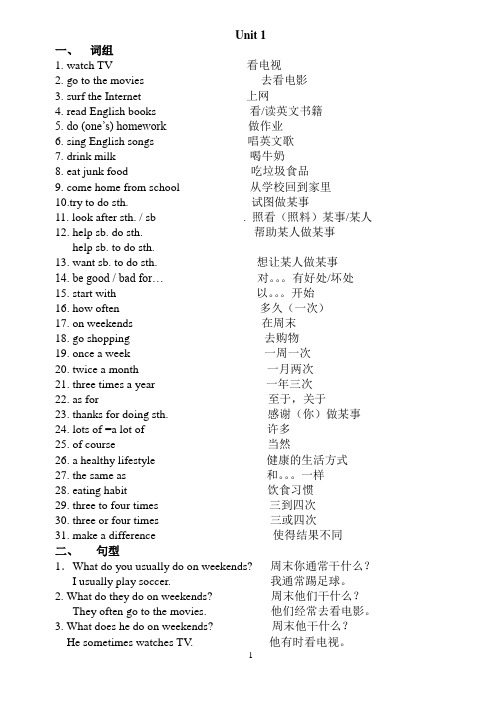
Unit 1一、词组1. watch TV 看电视2. go to the movies 去看电影3. surf the Internet 上网4. read English books 看/读英文书籍5. do (one’s) homework 做作业6. sing English songs 唱英文歌7. drink milk 喝牛奶8. eat junk food 吃垃圾食品9. come home from school 从学校回到家里10.try to do sth. 试图做某事11. look after sth. / sb . 照看(照料)某事/某人12. help sb. do sth. 帮助某人做某事help sb. to do sth.13. want sb. to do sth. 想让某人做某事14. be good / bad for… 对。
有好处/坏处15. start with 以。
开始16. how often 多久(一次)17. on weekends 在周末18. go shopping 去购物19. once a week 一周一次20. twice a month 一月两次21. three times a year 一年三次22. as for 至于,关于23. thanks for doing sth. 感谢(你)做某事24. lots of =a lot of 许多25. of course 当然26. a healthy lifestyle 健康的生活方式27. the same as 和。
一样28. eating habit 饮食习惯29. three to four times 三到四次30. three or four times 三或四次31. make a difference 使得结果不同二、句型1.What do you usually do on weekends? 周末你通常干什么?I usually play soccer. 我通常踢足球。
六年级上册英语单词Unit1-Unit6
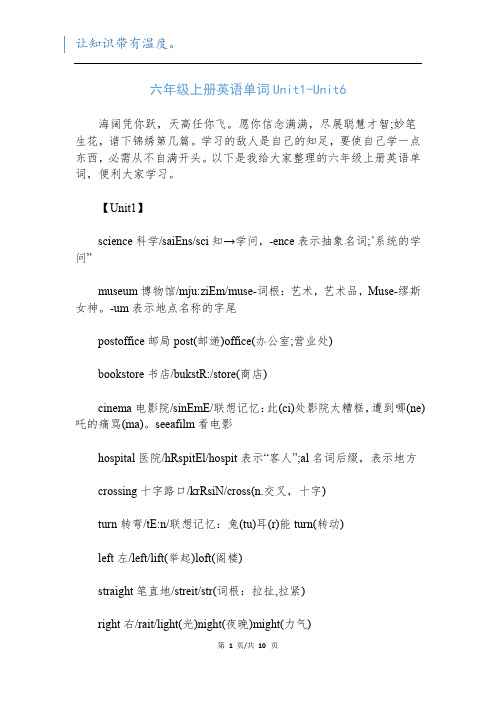
六年级上册英语单词Unit1-Unit6海阔凭你跃,天高任你飞。
愿你信念满满,尽展聪慧才智;妙笔生花,谱下锦绣第几篇。
学习的敌人是自己的知足,要使自己学一点东西,必需从不自满开头。
以下是我给大家整理的六年级上册英语单词,便利大家学习。
【Unit1】science科学/saiEns/sci知→学问,-ence表示抽象名词;’系统的学问”museum博物馆/mju:ziEm/muse-词根:艺术,艺术品,Muse-缪斯女神。
-um表示地点名称的字尾postoffice邮局post(邮递)office(办公室;营业处)bookstore书店/bukstR:/store(商店)cinema电影院/sinEmE/联想记忆:此(ci)处影院太糟糕,遭到哪(ne)吒的痛骂(ma)。
seeafilm看电影hospital医院/hRspitEl/hospit表示“客人”;al名词后缀,表示地方crossing十字路口/krRsiN/cross(n.交叉,十字)turn转弯/tE:n/联想记忆:兔(tu)耳(r)能turn(转动)left左/left/lift(举起)loft(阁楼)straight笔直地/streit/str(词根:拉扯,拉紧)right右/rait/light(光)night(夜晚)might(力气)ask问/B:sk/mask(面具)cask(木桶)sir(对男子的礼貌称呼)先生/sE:/interesting好玩的/intristiN/inter(埋)rest(休息)interest(爱好,爱好)Italian意大利的/itAljEn/restaurant餐馆/restErRN/联想:在饭店休息(rest)时观察,一(a)油桶(u象形)让蚂蚁(ant)爬满pizza比萨饼/pi:tsE/street大街;街道/stri:t/联想:绿化的街道(street),两旁都是树(tree)get到达/get/GPS全球(卫星)定位系统gave(give的过去式)供应;交给/geiv/feature特点/fi:tFE/feat(做)+ure(构成抽象名词)→做事的状态→做事特征。
新标准大学英语综合教程1(Unit1-Unit6课文翻译)
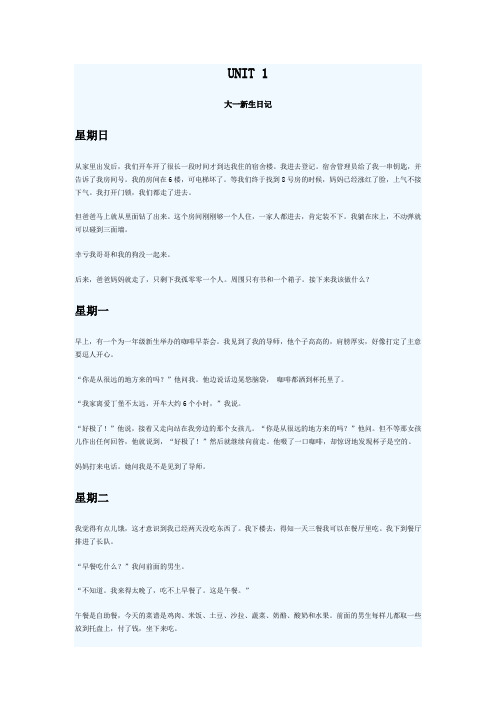
UNIT 1大一新生日记星期日从家里出发后,我们开车开了很长一段时间才到达我住的宿舍楼。
我进去登记。
宿舍管理员给了我一串钥匙,并告诉了我房间号。
我的房间在6楼,可电梯坏了。
等我们终于找到8号房的时候,妈妈已经涨红了脸,上气不接下气。
我打开门锁,我们都走了进去。
但爸爸马上就从里面钻了出来。
这个房间刚刚够一个人住,一家人都进去,肯定装不下。
我躺在床上,不动弹就可以碰到三面墙。
幸亏我哥哥和我的狗没一起来。
后来,爸爸妈妈就走了,只剩下我孤零零一个人。
周围只有书和一个箱子。
接下来我该做什么?星期一早上,有一个为一年级新生举办的咖啡早茶会。
我见到了我的导师,他个子高高的,肩膀厚实,好像打定了主意要逗人开心。
“你是从很远的地方来的吗?”他问我。
他边说话边晃悠脑袋,咖啡都洒到杯托里了。
“我家离爱丁堡不太远,开车大约6个小时,”我说。
“好极了!”他说,接着又走向站在我旁边的那个女孩儿。
“你是从很远的地方来的吗?”他问。
但不等那女孩儿作出任何回答,他就说到,“好极了!”然后就继续向前走。
他啜了一口咖啡,却惊讶地发现杯子是空的。
妈妈打来电话。
她问我是不是见到了导师。
星期二我觉得有点儿饿,这才意识到我已经两天没吃东西了。
我下楼去,得知一天三餐我可以在餐厅里吃。
我下到餐厅排进了长队。
“早餐吃什么?”我问前面的男生。
“不知道。
我来得太晚了,吃不上早餐了。
这是午餐。
”午餐是自助餐,今天的菜谱是鸡肉、米饭、土豆、沙拉、蔬菜、奶酪、酸奶和水果。
前面的男生每样儿都取一些放到托盘上,付了钱,坐下来吃。
我再也不觉得饿了。
妈妈打电话来。
她问我有没有好好吃饭。
星期三早上9点钟我要去听一个讲座。
我醒时已经8:45了。
竟然没有人叫我起床。
奇怪。
我穿好衣服,急匆匆地赶到大讲堂。
我在一个睡眼惺忪的女生旁边坐下。
她看了看我,问:“刚起床?”她是怎么看出来的?讲座进行了1个小时。
结束时我看了看笔记,我根本就看不懂自己写的字。
那个女生名叫苏菲,和我一样,也是英语文学专业的学生。
新视野大学英语1第三版Unit 1-6 课后练习答案

Unit 11.选词填空explore(v.勘探,探测) transmit(v.传送,传递,传播) resource(n.资源) emerge(v.出现,为···所公认) yield(v.产生,出产,屈从,让步) pose(v.摆姿势,导致) assume(v.认为,假定,假设) confidence(n.信任信赖,自信心) inherit(v.沿袭,秉承,继承) comprehensive(a.综合的,多方面的)1. Given the chance to show his ability, he regainedconfidence and began to succeed in school.2. It is so difficult to explore the bottom of the ocean because some parts are very deep.3. It was about 30 seconds before Alex emerged from the water; we were quite scared.4. We often assume that when other people do the same things as we do, they do them for the same reasons; but this assumption is not always reasonable.5. There is widespread concern that the rising unemployment may pose a threat to social stability.6. After a(n) comprehensive physical exam, my doctor said I was in good condition except that my blood pressure was a little high.7. It is well known that China is a country with rich natural resources and a very big population.8. Some people believe that the earth can yield enough food to support at least twice its present population.9. Saminherited the gift of imagination from his family, but he lacked the driving power to take action.10. A bee that has found honey is able to transmit to other bees the information they need in order to collect the honey.2.15选10attain赢得,获得,得到fascinating迷人的,吸引人fulfill履行,执行pursue追求,致力于available可获得的可利用的qualify使合适,合格raise提升,增加passion强烈的爱好,热爱virtually实际上classify分类归类acquire获得,取得,学到fashionable流行的especially特别的sample样品,标本prosperous繁荣的University students come from different parts of the country with various purposes. However, a closer look at their reasons for studying at the university will enable us to (1)classify them roughly into three groups: those who have a(n) (2)passion for learning, those who wish to (3)attain a bright future, and those who learn with no definite purpose. Firstly, there are many students who learn simply because they (4)pursue their goal of learning. Some read a wealth of British and American novels because they are keenly interested in literature. Others sit in front of thecomputer screen, working on a new program, (5)virtually day and night, because they find some computer programs (6)fascinating, and they dream of becoming a "Bill Gates" one day. Secondly, there are students who work hard mainly for a better and more(7)prosperous future. It seems that the majority of students fall into this group. After admission to the university, they read books after books to (8)acquire knowledge from all of the resources which are (9)available to them, and finally, to succeed in the future job market. Thirdly, there are still some students who learn without a clear goal. They take courses, finish homework, enjoy life on campus, but don't want to(10)sample anything new or challenging. They have no idea what they will be doing after college. And they may end up with nothing in their lives.3.选词组open the door to 给···以机会in advance 预先,提前all at once 同时,一下子reap the benefits (of) 得享(某事物)的好处make the most of最大限度的利用某物over time逐渐地,慢慢地get by过活,活的去stand a chance (of)有(做成某事)的希望remind ... of 使某人想起take pleasure in乐于做某事1. My familygot by on my father's unemployment benefit after he lost his job.2. Many subway riders read books or listen to music in order to make the most of their time on the way to work.3. In order to make sure he would be able to attend the meeting, I called him up two weeksin advance.4. Experts say our company is amazing in that sales have been increasing steadily over time .5. In order to reap the benefits of the physical exercise, you have to exercise regularly, and for at least half an hour each time.6. They all tried to talk all at once , but I couldn't hear anything they said.7. Yellow flowers in the field always remindme of my childhood in the countryside.8. We have been practicing for so long and so hard that our team should stand a chance ofwinning the game.9. Research on genes will open the door to exciting new medical treatments.10. Every one of you has made a contribution and I take pleasure in acknowledging what each of you has done to make this academic convention such a success.4.汉译英孔子是中国历史上著名的思想家、教育家,是儒家学派(Confucianism)的创始人,被尊称为古代的"圣人"(sage)。
人教版小学英语(六年级上册)Unit1-6 Let's talk Read and write
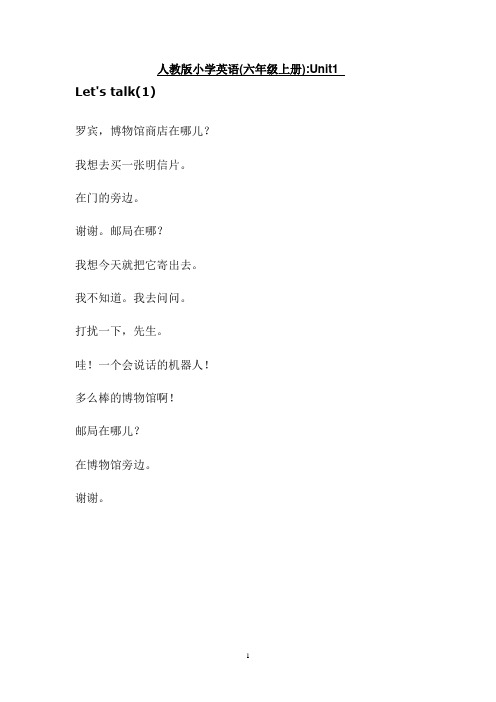
Let's talk(1)罗宾,博物馆商店在哪儿?我想去买一张明信片。
在门的旁边。
谢谢。
邮局在哪?我想今天就把它寄出去。
我不知道。
我去问问。
打扰一下,先生。
哇!一个会说话的机器人!多么棒的博物馆啊!邮局在哪儿?在博物馆旁边。
谢谢。
Let's talk(2)多么有趣的电影!是的,但是现在我饿了。
我知道一家非常棒的意大利餐厅。
我喜欢吃披萨!餐厅在哪儿?它在公园附近的东方街上。
我们怎么去那儿?在书店左转。
然后在医院右转。
好的。
我们出发!Read and write罗宾有导航功能!吴一凡的祖父给了罗宾一个新的功能。
现在它有了导航功能。
他现在能够帮助男孩们找到意大利餐厅。
我们现在在电影院的前面。
直走,然后在书店那里左转。
请跟我走!远吗?不远。
我们现在在医院的后面。
现在我们右转,然后再右转一次。
餐厅在那儿!我的新导航功能起作用了!是的!我会去告诉祖父。
但是让我们先吃饭吧。
我太饿了!Let's talk(1)早上好,史密斯老师!你们好,孩子们。
你们今天来得很早。
你们怎么来学校的?通常我走路来。
有时我也会坐公交车来。
我通常骑自行车来。
你怎么来学校,史密斯老师?开车?有时会,但是我通常走路来。
那是个很好的锻炼方式。
麦克、艾米和史密斯老师怎么来学校的?Let's talk(2)约翰先生,我怎么去复兴医院?去那边乘57路公交车。
谢谢。
哇!这么多自行车照片!这些照片来自我在美国的表弟。
这是什么?一个头盔。
在美国,骑自行车的人必须带(头盔)。
我知道了。
哦,公交车来了!再见,约翰先生。
嗨,别闯红灯!哦,对!谢谢。
我必须注意交通信号灯!关于骑自行车你从对话中学到了什么?Read and write不同的去学校的方法在德国慕尼黑,一些孩子走路去学校。
在美国阿拉斯加,天经常下雪。
一些孩子乘雪橇去学校。
特别快。
在中国江西,一些孩子每天摆渡去学校。
在苏格兰帕帕韦斯特雷岛,孩子们也是摆渡去学校。
但是在2009年,他们开始乘飞机去学校,因为渡船已经不工作了。
6B Unit 1-6字词句翻译汇总

Unit 1 Lesson 1A 单词1. 假日,假期2. “是”的过去式3.好极了,奇妙的4.“去”的过去式5.父母6.当然7.参观,拜访8.椰子9.城市10.日记11.花费,度过12.前夜13.节目14.令人激动的15.吃的过去式16.美味的,可口的B.短语1.返回学校,回到学校2.玩得开心,过得快乐3.和我父母去海南4.度过愉快的时光5.去参观三亚6.许多香蕉树7.椰子树8.一座美丽的城市9.非常喜欢它10.当然11.在夏天12.彼得的日记13.过春节14.在北京15.在除夕夜16.看电视17.电视节目18.那天晚上19.吃饺子c. 句子1.他们的假期过得怎样?2.他们玩得开心吗?3.你的假期过得怎么样?4.它好极了。
5.我和父母去了海南。
6.你们玩得开心吗?当然。
7.我们去参观了三亚。
8.我们在那里见到了许多香蕉树,椰子树和花。
9.它是一座美丽的城市。
10.我们非常喜欢它。
11.你也想去那里吗?12.我将在夏天去那里。
13.太好了。
14.我在北京过的春节。
15.我很快乐。
16.在除夕夜我看了电视。
17.那些电视节目很有趣,令人兴奋。
18.那天晚上我吃了饺子。
19.他们味道不错。
20.我喜欢春节。
Lesson 2A.单词1.在。
期间2.很棒的,好级了3.上海4.西安5.哈尔滨6.哪里7.am的过去式8.is的过去式9.are的过去式B.短语1. 在家里2. 在上海3. 在北京4. 在昆明5.在假期期间C.句子1.你的假期过得怎样?2.过得很好。
3.假期期间你在哪里?4.我在家里。
5.我在上海。
Lesson 3.A.单词1.“打电话”的过去式昨天2.书店感兴趣的3.“买”的过去式故事书4.卡通,动漫电影5.“喜爱,享受。
的乐趣”的过去式6.星期天在。
附近B.短语1.给你打电话2.不在家3.在书店4.许多新书5.对他们感兴趣6.买了一本故事书7.一本卡通8.去看电影9.昨天晚上10.上床睡觉11.在十点半12.有点晚13.在我家附近的书店14.见到许多新书15.喜爱看书C.句子1.昨天我给你打电话了。
【精品】人教PEP版英语三年级下册期末复习Unit 1-6知识点归纳总结(全册)
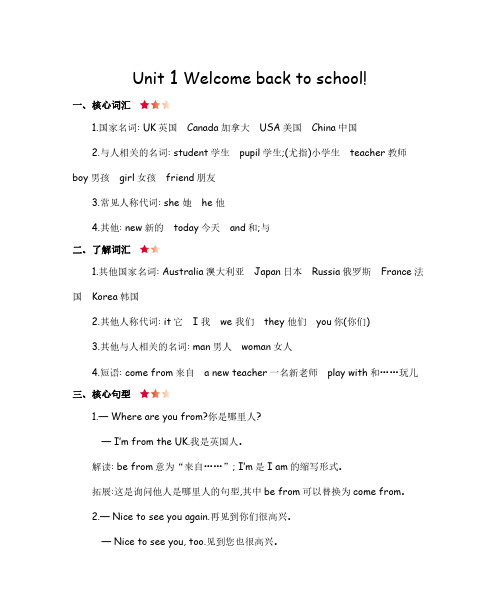
Unit1Welcome back to school!一、核心词汇1.国家名词:UK英国Canada加拿大USA美国China中国2.与人相关的名词:student学生pupil学生;(尤指)小学生teacher教师boy男孩girl女孩friend朋友3.常见人称代词:she她he他4.其他:new新的today今天and和;与二、了解词汇1.其他国家名词:Australia澳大利亚Japan日本Russia俄罗斯France法国Korea韩国2.其他人称代词:it它I我we我们they他们you你(你们)3.其他与人相关的名词:man男人woman女人4.短语:come from来自a new teacher一名新老师play with和……玩儿三、核心句型1.—Where are you from?你是哪里人?—I’m from the UK.我是英国人。
解读:be from意为“来自……”;I’m是I am的缩写形式。
拓展:这是询问他人是哪里人的句型,其中be from可以替换为come from。
2.—Nice to see you again.再见到你们很高兴。
—Nice to see you,too.见到您也很高兴。
解读:“Nice to see you.”是日常见面常用的问候和寒暄用语。
3.Hi,I’m Amy.I’m from the UK.嗨,我是埃米。
我是英国人。
4.This is Amy.She’s a new student.这是埃米。
她是一名新学生。
四、了解句型1.Welcome!欢迎!2.We have two new friends today.今天我们有两个新朋友。
3.What about you?=How about you?=And you?你呢?解读:这三个句子可以通用,通常用于回答完别人的问题后,用同样的问题反问对方,希望对方回答相同的问题。
4.Let’s play a game!我们玩儿游戏吧!解读:let’s=let us;let’s/let us后接动词原形。
剑桥国际英语教程一级unit1-6_重点句子(免费版)
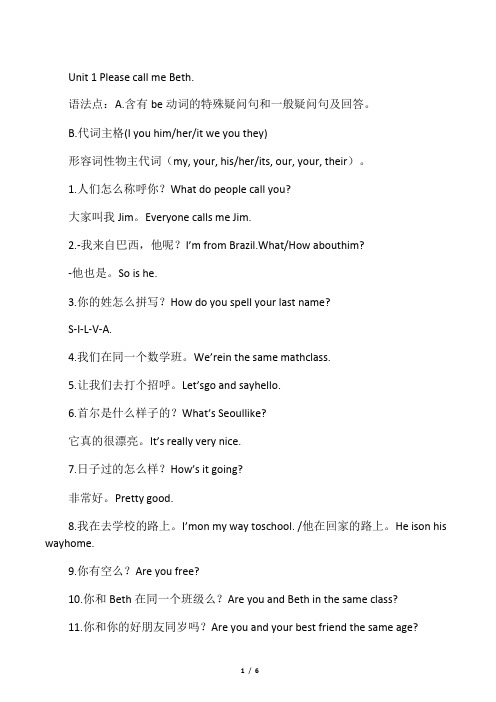
Unit 1 Please call me Beth.语法点:A.含有be动词的特殊疑问句和一般疑问句及回答。
B.代词主格(I you him/her/it we you they)形容词性物主代词(my, your, his/her/its, our, your, their)。
1.人们怎么称呼你?What do people call you?大家叫我Jim。
Everyone calls me Jim.2.-我来自巴西,他呢?I’m from Brazil.What/How abouthim?-他也是。
So is he.3.你的姓怎么拼写?How do you spell your last name?S-I-L-V-A.4.我们在同一个数学班。
We’rein the same mathclass.5.让我们去打个招呼。
Let’sgo and sayhello.6.首尔是什么样子的?What’s Seoullike?它真的很漂亮。
It’s really very nice.7.日子过的怎么样?How’s it going?非常好。
Pretty good.8.我在去学校的路上。
I’mon my way toschool. /他在回家的路上。
He ison his wayhome.9.你有空么?Are you free?10.你和Beth在同一个班级么?Are you and Beth in the same class?11.你和你的好朋友同岁吗?Are you and your best friend the same age?12.一会见。
See you later.明天见。
See you tomorrow.13.祝你愉快。
/祝你度过快乐的一天。
Have a good day.*14. Name is an important part of your identity.名字是你身份的重要组成部分。
七年级下册1到6单元英语知识点

七年级下册1到6单元英语知识点
以下是七年级下册英语1到6单元的一些主要知识点:
1. Unit 1: Personal Information
-介绍自己的基本信息,如姓名、年龄、国籍等。
-问与回答关于个人信息的问题。
-学习使用形容词来描述自己和他人。
2. Unit 2: School Life
-学习和使用关于学校生活的词汇,如科目、课程表、校园设施等。
-学习描述日常活动和时间表。
-学习使用一般现在时来表达习惯和常规。
3. Unit 3: Hobbies and Interests
-学习和使用关于爱好和兴趣的词汇,如运动、音乐、艺术等。
-学习表达自己的喜好和不喜欢。
-学习使用动词的-ing形式来描述正在进行的活动。
4. Unit 4: Daily Routines
-学习和使用关于日常生活的词汇,如起床、吃早餐、上学等。
-学习描述日常活动的顺序和时间。
-学习使用一般现在时来描述日常例行事务。
5. Unit 5: Food and Health
-学习和使用关于食物和健康的词汇,如水果、蔬菜、饮食习惯等。
-学习表达食物的喜好和不喜欢。
-学习使用情态动词can和should来表达能力和建议。
6. Unit 6: Travel and Transportation
-学习和使用关于旅行和交通的词汇,如旅游景点、交通工具等。
-学习描述旅行计划和行程。
-学习使用一般将来时来表达将来的计划和打算。
1-6英语单词Unit 1

三上Unit 1ruler 尺子pencil 铅笔eraser 橡皮crayon 蜡笔bag 书包pen 钢笔pencil box 铅笔盒bookUnit 2red 红色green 绿色yellow 黄色blue 蓝色black 黑色brown 棕色white 白色orange 橘黄色Unit 3 face 脸ear 耳朵eye 眼睛nose 鼻子mouth 嘴巴arm 手臂head 头hand 手body 身体leg 腿foot 脚Unit 4duck 鸭子pig 猪cat 猫bear 熊dog 狗elephant 大象monkey 猴子bird 鸟tiger 老虎panda 熊猫zoo 动物园funny 滑稽的Unit 5bread 面包juice 果汁egg 蛋milk 牛奶water 水cake 蛋糕fish 鱼rice 米饭Unit 6one 一two 二three 三four 四five 五six seven 七eight 八nine 九ten 十plate 盘子三下Unit 1UK 英国USA 美国Canada 加拿大China 中国she 她student 学生pupil 小学生he 他teacher 老师new 新的friend 朋友today 今天Unit 2father 爸爸mother 妈妈brother 兄弟sister 姐妹man 男人woman 女人grandmother 祖母grandfather 祖父family 家庭Unit3thin 瘦的fat 胖的tall 高的short 矮的短的long 长的small 小的big 大的giraffe 长颈鹿children 孩子们tail 尾巴Unit 4on 上面under 下面in 里面in front of 在前面between 在中间behind 在后面beside 在旁边above 在上面chair 椅子desk 桌子ball 球box 盒子car 车boat 船map 地图toy 玩具Unit 5pear 梨orange 橘子apple 苹果banana 香蕉watermelon 西瓜strawberry 草莓grape 葡萄buy 买fruit 水果Unit 6 eleven 11twelve 12thirteen 13fourteen 14fifteen 15 sixteen 16seventeen 17eighteen 18ninteen 19twenty 20四上Unit 1classroom 教室window 窗户door 门fan 风扇blackboard 黑板light 灯picture 图片teacher’s desk 讲台wall 墙壁floor 地板clean 打扫help 帮助Unit 2schoolbag 书包chinese 语文english 英语maths 数学storybook 故事书candy 糖果notebook 笔记本key 钥匙lost 丢失cute 可爱的Unit 3strong 强壮的friendly 友好的quiet 安静的shoe 鞋hair 头发glasses 眼镜his 他的her 她的their 他们的my我的your你(们)的,our我们的or 或者right 对的hat 帽子Unit 4bedroom 卧室living room 客厅kitchen 厨房bathroom 浴室study 书房bed 床phone 电话fridge 冰箱sofa 沙发table 桌子find 找到Unit 5beef 牛肉chicken 鸡肉noodles 面条soup 汤vegetable 蔬菜chopsticks 筷子bowl 碗spoon 勺子fork 叉子knife 刀breakfast 早餐lunch 午餐dinner 正餐ready 准备好help yourself!自己吃pass 传递try 尝试Unit 6parents 父母cousin 同辈表亲或堂亲uncle 叔叔aunt 阿姨doctor 医生cook 厨师nurse 护士farmer 农民driver 司机people 人puppy 小狗job 工作四下Unit 1first floor 一楼second floor 二楼teachers’office 教师办公室library 图书馆playground 操场computer room 机房art room 美术教室music room 音乐教室next to 挨着,隔壁homework 作业class 班级way 方向Unit 2English class 英语课music class 音乐课get up 起床go to school 去上学gohome 回家go to bed 上床睡觉over 结束kid 小孩hurry 快一点come on 加油,快一点just a minute 稍等Unit3 cold 冷cool 凉爽hot 炎热warm 温暖cloudy 刮风的snowy 下雪的sunny 晴朗的windy 刮风的rainy 下雨的outside 室外be careful 小心weather 天气New York 纽约London 伦敦Moscow 莫斯科Singapore 新加坡Sydney 悉尼world 世界Unit 4 tomato 番茄potato 土豆carrot 胡萝卜green beans 豆角horse 马cow 奶牛sheep 绵羊hen 母鸡these 这些those 那些animal 动物garden 花园farm 农场goat 山羊mouse 老鼠Unit 5clothes 衣服pants 裤子hat 帽子shirt 衬衫skirt 短裙dress 连衣裙shorts 短裤sock 袜子coat 外套sweater 毛衣jacket 夹克衫shop 商店whose 谁的mine 我的yours 你的pack 收拾(行李)wait 等一等Unit 6gloves 手套scarf 围巾umbrella 雨伞sunglasses 太阳镜pretty 漂亮的expensive 昂贵的cheap 便宜的nice 好的of course 当然sale 特价销售more 更多的五上Unit 1old 年老的young 年轻的funny 滑稽的kind 和蔼的strict 严格的polite 有礼貌的clever 聪明的hard-working 用功的helpful 有帮助的shy 害羞Unit 2Monday 周一Tuesday 周二Wednesday 周三Thursday 周四Friday 周五Saturday 周六Sunday 周weekend周末play football 踢足球watch TV 看电视wash clothes 洗衣服do homework 做作业readbooks 看书should 应该Unit 3sandwich 三明治hamburger 汉堡salad 沙拉ice cream 冰淇淋sweet 甜的healthy 健康的delicious 美味的hot 辣的fresh 新鲜的favourite 最喜欢的drink 喝;饮料food 食物hungry 饿的thirsty 渴的onion 洋葱Unit 4sing songs 唱歌play the pipa 弹琵琶do kung fu 练武术dance 跳舞draw cartoons 画漫画cook 烹饪swim 游泳play basketball 打篮球play ping-pong打乒乓speak English 说英语wonderful 极好的No problem 没问题want 想要send 发送Unit 5clock 闹钟plant 植物water bottle 水瓶bike 自行车photo 照片their 他们的move 搬家everywhere 到处dirty 脏的Unit 6forest 森林river 河流lake 湖泊mountain 山hill 小山tree 树building 楼房village 村庄house 房子nature 自然high 高的五下Unit 1do morning exercises 早锻炼have ... class 上课eat breakfast 吃早饭eat dinner吃晚饭play sports 做运动clean my room 打扫房间go for a walk 去散步goshopping 去购物take a dancing class 上舞蹈课after 在...之后start 开始usually 通常late 迟的sound 听起来also 也busy 忙碌的need 需要letter 信always 总是win 获胜Unit 2spring春summer夏autumn秋winter 冬season 季节go swimming 去游泳go on a picnic 去野餐pick apples 摘苹果make a snowman 堆雪人which 哪一个best 最good job 做得好!because 因为vacation 假期all 全部leaf 树叶fall 掉下,秋天paint 画画Unit 3January一月February二月March三月April四月May五月June六月July 七月August八月September九月October十November十一月December十二月a few 一些thing 事情sports meet 运动会Easter 复活节trip 旅contest 比赛The Great Wall 长城National Day 国庆节Thanksgiving Day感恩节Christmas 圣诞节holiday 假日Unit 4first 第一1st second 第二2nd third 第三3rd fourth 第四4thfifth 第五5th twelfth 第十二12th twentieth 第二十20th twenty-first第二十一21sttwenty-thir第二十三23rdspecial 特殊的fool 愚蠢的diary 日记still 还是noise 声音fur 毛Unit 5mine 我的yours 你的his 他的hers 她的theirs 他们的ours 我们的climb 攀登each 每一个other 其他each other 相互excited 兴奋的like 像Unit 6keep 保持keep to the right靠右Keep your desk clean保持课桌干净talk quietly 小声说话turn 顺序take turns 按顺序来bamboo 竹anything 任何事else 其他的exhibition 展览say have a look 看一看sure 当然六上Unit 1science museum科技馆post office 邮局bookstore 书店cinema 电影院hospital 医院crossing 十字路口turn 转弯left 左right 右straight 直走ask 问sir 先生interesting 有趣的italian 意大利的restaurant 餐馆street 街道get 到达feature 特点follow 跟着far 远tell 告诉Unit 2On foot 步行by 乘bus 公交车plane 飞机taxi 出租车ship 轮船subway 地铁train 火车slow down 慢下来stop 停early 早must 必须wear 穿戴pay attention 注意traffic lights 交通灯sled 雪橇ferry 轮渡fast 快的Unit 3visit 拜访,餐馆see a film 看电影take atrip 去旅行supermarket 超市evening 晚上tonight 今晚tomorrow 明天next week 下周dictionary 字典comic book 连环画册word book 单词书postcard 明信片lesson 课space 太空travel 旅行half 一半price 价格together 一起moon 月亮poem 诗Unit 4studies 学习(三单)puzzle 字谜hiking 远足Pen pal 笔友hobby 爱好jasmine 茉莉花idea 想法amazing 令人惊奇的goal 射门join 加入club 俱乐部share 分享Unit 5factory 工厂worker 工人postman 邮递businessman 商人fisherman 渔民police officer 警察scientist 科学家pilot 飞行员coach 教练country 国家sea 海university 大学reporter 记者use 使用type 打字quickly 快速的secretary 秘书Unit 6angry 生气的afraid 害怕sad 伤心的worried 担心的happy 高兴的see a doctor 看病more 更多take a deep breath深呼吸count to ten 数到十chase 追赶mice 老鼠(复数)hurt 受伤的ill 生病feel 感觉well 好的sit 坐hear 听到stuck 陷住mud 泥地pull 拉。
粤人民版英语六年级上unit 1-6练习 总复习
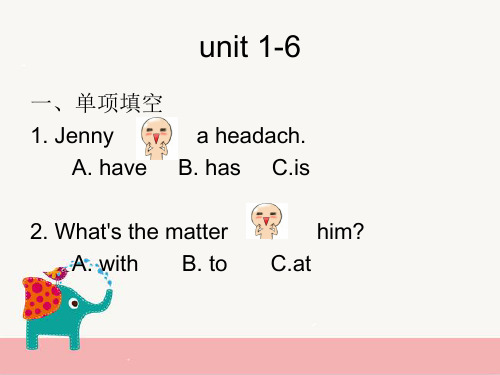
八、根据句意及字母提示补全单词
1. I don't like the s picy Thailand.
food in
2. I like winter best. It is s nowy in winter.
3. W here did you come from? I came from Canada
A. on
B. to
C. at
5. Turn right at the traffic light. A. on B. to C.at
6. We are going to the zoo. A. on B. for C.to
7. What's wrong with you ? A. What's B. Where's C.When's
15. 你想告诉你的朋友,上星期你在北京,你 应该这样说:B A. I'm going to Beijing this week. B. I was in Beijing last week. C. I'm from beijing.
16. 你的朋友上个月去了泰国,你想知道泰国 的食物怎么样,你应该这样问:A A. What was the food like in Thailand? B. What was the weather like in Thailand? C. Do you like spicy food?
Let's make the park clean
unit 5-6课后练习
单词挖空
1. g o o d.
5. sn o w y
2. b ad
6. tha i l a nd
3. t a st y
小学六年级英语Unit 1-6 重点知识梳理
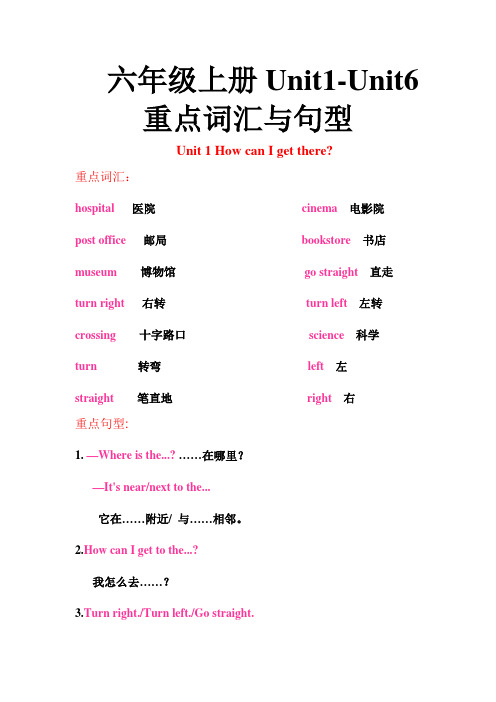
六年级上册Unit1-Unit6重点词汇与句型Unit 1 How can I get there?重点词汇:hospital 医院cinema 电影院post office 邮局bookstore 书店museum 博物馆go straight 直走turn right 右转turn left 左转crossing 十字路口science 科学turn 转弯left 左straight 笔直地right 右重点句型:1. —Where is the...?……在哪里?—It's near/next to the...它在……附近/ 与……相邻。
2.How can I get to the...?我怎么去……?3.Turn right./Turn left./Go straight.右转。
/左转。
/直走。
问(ask)路和指(tell)路英语中常见问路的表达方法:Excuse me, where is+地点, please?Excuse me, how can I get to+地点?Excuse me, can you tell me where+地点+is?英语中常见指路的表达方法:It's+表示位置的短语.Turn left/right at+地点.Go straight along+地点.常见的方位介词及短语:1. in表示“在……里面”。
2. on表示“在……上面”,但两者互相接触。
3. under表示“在……下方”。
4. behind表示“在……后面”。
5. in front of表示“在……前面”,正好与behind相反。
6. beside 表示“在……旁边”。
7. above 表示“在……上面”,但两者不接触。
8. between 表示“在……中间”。
9. near表示“在……附近”。
10. next to 表示“在……附近”,相当于near。
11. in the middle of 表示“在......中间”12. over 在……上面;从……上方;穿越;over there 在那里六年级上册Unit 2 Ways to go to school重点词汇:bus 公共汽车plane 飞机taxi 出租汽车ship (大)船subway 地铁train 火车by (表示方式)乘on foot 不行stop 停下slow 慢的down 减少;降低slow down 慢下来重点句型:1.How do you get to...? 你怎么去……?2.I usually/often/sometimes come to school on foot/by...我通常/经常/有时候步行/乘……来学校。
unit 1-6教案

新目标英语(Go for it)七年级上全册教案Unit 1-6Unit 1 My name’s GinaPeriod One课前准备教师:准备游戏时所用的图片(食物、蔬菜、动物)。
学生:准备表演时所需道具(服装、假发)。
教学设计Step One :Present the sentence patterns.1.Play a game “How many words do you know?”(利用小游戏调动学生的积极性,同时通过对冠军的介绍引出本课。
)Teacher: After the study of the first three starters, I thinkmost of the students must have known a lot of words. How manywords do you know? Let’s play a game to see who know? Let’s play a game to see who knows the most.(Divide all the students into several groups and show a picture(图片略)to them with the computer. Every group can choose two students to join. They are asked to come to the blackboard and write down the words in 30 seconds.)(Group 2 is the champion group. They can write 11 words.)2.Introduce the champion group to the class.(引课方式贴近生活,学生易于接受)Teacher: Congratulations, now Group 2 is the champion. But I don’t know your names. Would you like to introduce yourselves to us?S1& S2:Yes.S1:Hello.My name is Li Lei. Nice to meet you.Ss: Hello, Li Lei. Nice to meet you ,too.Ss: Hello! What’s your name?S2:I’m Sun Ping. How do you do?Ss: How do you do ?Step Two: Drills.1.Make introductions.(通过句型的操练使学生更加熟练掌握所学的句式。
新目标英语九年级上册Units1-6试卷
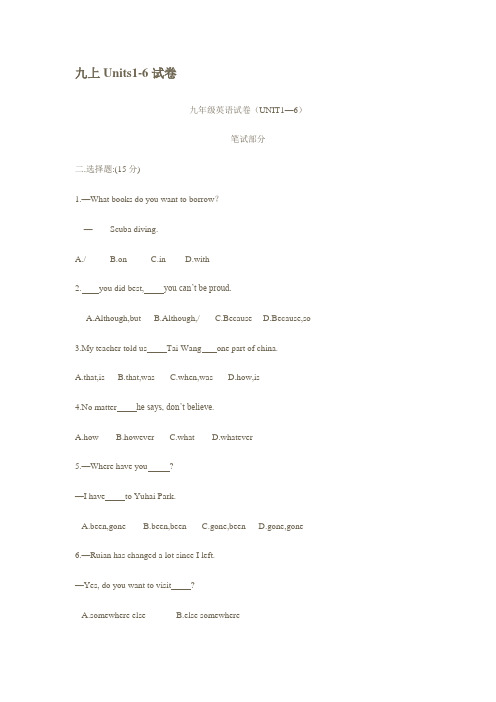
九上Units1-6试卷九年级英语试卷(UNIT1—6)笔试部分二.选择题:(15分)1.—What books do you want to borrow?—____Scuba diving.A./B.onC.inD.with2. you did best, you can’t be proud.A.Although,butB.Although,/C.BecauseD.Because,so3.My teacher told us Tai Wang one part of china.A.that,isB.that,wasC.when,wasD.how,is4.No matter he says, don’t believe.A.howB.howeverC.whatD.whatever5.—Where have you ?—I have to Yuhai Park.A.been,goneB.been,beenC.gone,beenD.gone,gone6.—Ruian has changed a lot since I left.—Yes, do you want to visit ?A.somewhere elseB.else somewhereC.anywhere elseD.else anywhere7.—LiuXiang did very well in the 28th Olympic Game.—I know, and I also know when .A.is he bornB.he is bornC.was he bornD.he was born8.—He’s worked in the facthory in his life.—.A.so am IB.So I amC.So I haveD.So have I9.—Are we of Zhu Qinan?—Certainly, He is the people’s of Wenzhou.A.proud,proudB.proud,prideC.pride,prideD.pride, pround10.—Look, the Feiyun Bridge 3 is being built.—Yes, It will about three years to finish it.A.spendB.costC.pay forD.take11. —Do you know “S.H.E”?—Of course, They have been popular .A.for two years agoB.since two years agoC.two years beforeD.since two yearrs before12.I don’t kn ow if he tomorrow. If he tomorrow, I’ll tell you.es,will comeB.will come,will comees, comesD.will come,comes13.—You have never been to the net bar(网吧) have you?—,my teathers always tell me there.A.Yes, to not goB.no, not to goC.Yes, not to goD.no, don’t to go14.—I’m sorry I’m late.—What a pity, the party for an hour.A.startedB.has startedC.starts d.has been on15.We must say ‘No’ to the terriots(恐怖分子), many people will be hurt.A.andB.OrC.thenD.as soon as三. 完形填空:(15分)When Zhao Hai entered middle school, he was much interested in English because he had a big dream. He 1 to go to America and worked there. He went to his 2 teacher, Mrs Hara, and talked with her about his dream. She was 3 kind that she said it was important for him to listen to English 4 on the radio, and to read English as much as he could.Then he began to study very 5 .But he couldnot go on studying English 6 his father died of illness. He could not go to 7 and had to work in his uncle’s shop. He did not give up his dream, so he tried to study English late 8 after he finished his work in the shop.Zhao Hai worked in his uncel’s shop for many years and9 some money. But his money was so little that he had no 10 to go to America yet. One 11 his uncle died, so he had to live by himself. With the money he had saved, he opened his 12 shop. In order to(为了)make his dream 13 , he worked even harder than before and his shop got bigger and bigger. Many people went to his shop to buy things. Among them there were 14 . He talked with them in English. HisEnglish helped him a lot. At last he said to himse lf, “It is really useful to learn English15 it is hard for me to go to America.”( )1.A.wanted B.decided C.liked D.planned( )2.A.head B.Chinese C.English D.geography( )3.A.very B.rather C.too D.so( )4.A.programs B.news C.songs D.stories( )5.A.hard B.well C.carefully D.good( )6.A.if B.because C.though D.until( )7.A.town B.college C.school D.America( )8.A.in the morning B.druing the day C.at night D.in the afternoon( )9.A.got B.made C.received D.saved( )10.A.chance B.time C.right D.way( )11.A.morning B.day C.evening D.night( )12.A.big B.own C.nice D.shoe( )e true e here e in e out( )14.A.Japanese B.Germans C.Chinese D.Americans( )15.A.when B.though C.so D.unless四阅读理解(30分)(一)Once there were five beggars(乞丐). One was English, one Turkish(土耳其人), one Greek(希腊人),one was an Arab(阿拉伯人) and one was Persian(波斯人). One day they met and decided to stay together, sharing(分享) what they had and helping each other in times of trouble.Soon a man passed them in the street and gave them a coin(硬币). They talked about what to do with it. At last they decided to buy something to eat.“Let’s buy some grapes(葡萄)!” said the Englishman..but the Turk wanted “uzum”,the Arab “aneb”,the Greek “stafelea”, and the Persian insisted on(坚持) “angur”.They did not understand each other’s language very well. Soon they were quarrelling(争吵) and even fighting.While they were fighting about how to spend the money, a stranger came along. He knew all five languages. He asked them why they were fighting. After they told him, he said.“Give me your coin. I will buy what you wish.”He was soon back with a bunch(串)of grapes. Each beggar was happy, as each had what he had wanted.根据短文,选择正确答案。
unit1--6单元单词表

目标英语七年级上册(7A)词汇检测(1--6单元)Unit11. 我的2. 名字3. 是4. 时钟5. 我6. 是7. 好的;令人愉快的8. 什么、9. 遇见;相逢10. 你;你们11. 不定式符号向;朝;至;达12. 他的13. 你的;你们的14. (表示问候)喂15. (表示问候或打招呼)嗨16. 和;又;而且17. 问题;难题;询问;疑问18. 她的19. 回答;答复;答案20. 第一20. 看;望;看起来,看;注视22. 名字23. 最后的;上一个的24. 姓氏25. 男孩26. 女孩27. 一(用来代替单数的人或物) 28. 零29. 二30. 三31. 四32. 五33. 六34. 七35. 八36. 九37. 电话38. 数;数字39. 电话号码40. 电话;电话机41. 电话号码42. 它43. 卡;卡片;纸牌 44. 身份证45. 姓氏Unit21. 这;这个2. 铅笔3. 钢笔4.书5. 橡皮;铅笔擦;黑板携6. 尺;直尺7. 箱;盒;橱8. 铅笔盒;文具盒9. 双肩背包10. 卷笔刀;铅笔刀11. 字典;词典12. (表示肯定)是13. 14.(表示否定)不;不是15. (构成否定形式)不是16.请原谅17. 感谢18.好;不错19. 用(表示方法,媒介,工具等)20. 英语;英文21.一个(只,把,台……)22.(构成否定句、疑问句的助动词无意义)23. 做;干;行动24. 拼写25. 棒球26. 手表27. 电脑;电子计算机28. 运动;游泳29. 电子游戏30. 钥匙31. 笔记本32. 环(状物);戒指33. 打电话34. 在……(里面或附近);在……(点刻);以35. 表示特指的人、物、事或群体36. 丢失的;遗失的37. 找回的38. 失物招领39. 请(祈使句用作请求的客套话)40. 学校41.—套;—副42. (属于)……Unit31. 姐;妹3. 爸爸;父亲6. 祖母;外祖母7. 祖父;外祖父8. 朋友9. 祖父母;外祖父母10. 那些11. 是12. 这些13. 她14. 他15.儿子16. 堂(表)兄弟;堂(表)姐妹17. 女儿18. 叔;伯;舅;姨夫;姑父19. 姨母;姑母;伯母;婶母20.亲爱的21. 为了……22. 为……而感谢23. 照片;相片24. 这里;在这里25.笔友Unit41.(疑问副词)在哪里2.桌子3. 床4. 梳妆台;碗柜5. 书橱;书箱6. 沙发7. 椅子8. 抽屉9. 植物10. 在……之下11. 在……上12. 在……里面13.知道;了解14. 书包;提包;口袋15. 数学16. 闹钟17. 激光唱片;光盘18. 录像,视频19. 录像带20. 帽子21. 拿走;带到22. 东西,物23. 朝、向、至、达24.能;可以;会25. 拿来;取来;带来26. 一些;若干27. 需要28. 地板;地面29. 房间30.电视;电视机士31. 书桌;课桌32. 图画Unit51. 有;吃;饮2. 英式足球3. 球4. 英式足球5. 网球6. (网球、羽毛球的)球拍7. 网球拍8. 乒乓球9. 排球10. 篮球11.(网球、乒乓球等的)球拍12. 做;干;行动13.允许;让14. 我们(we的宾语)15. 玩;打球16. 好;对;满意地17. (表让步、同意等)好罢;嗯18. 听起来19. 良好的;令人满意的20. 运动;游戏21. 我们22. 大量的23. 社团;俱乐部24. 更多的;更大的25. 上课;(一节)课;班级26. 有趣的;令人感兴趣的27. 无聊的;令人生厌的28. 有趣的;令人愉快的29. 困难的30. 轻松的31. 观看;注视32. 看电视33. 有;吃;饮(have的第三人称单数形式)34. 美妙的;大的35.收藏品;收集物36. 但是37. 参加体育运动或比赛38. 只;仅仅39. 每一;每个40. 天;日间;白天;一日Unit61. 喜欢2.香蕉3. 汉堡包4. 西红柿5. 花椰菜6. (美)炸马铃薯条;薯条7. 橙子;柑子;橘8. 冰9. 奶油;乳脂10. 冰淇淋11. 沙拉12.草莓13. 啊;噢;呀(表惊呀;恐惧等)14. 蛋;鸡蛋15. 苹果16. 胡萝卜17. 鸡;鸡肉18. 水果19. 蔬菜;植物20. 早餐21. 午餐22. 正餐;晚餐23. 奔跑的人或动物24. 吃25. 跑;奔跑26. 星星;明星27. 许多;很多28. 大量;许多29. 健康的;强健的30. (饭后的)甜食31. 清单Unit 1-61.家具2. 人;人民3. 空白4. 交谈;谈话5. 另外的人(物);其他的6. 也;并且。
英语unit1-6

英语unit1-6英语1-6单元句子Unit11-他觉不被认为是一位伟大的作家He is by no means regarded as/considered a great writer.2-长时间步行之后你必然感到疲惫(be bound to )After a long walk, you are bound to feel tired.3-你会常常用到这些数字所以应该记住他们You will use these figures on a regular basis, so you must commit them to memory.4-留心找一个使你在公司晋升的机会,这样的机会不常有Watch out for a chance to get promotion in the company ,because they do not come very often.5-他们找了一个方便的地方坐下来休息They sought out a handy place where they might sit down and rest.6-他是那么的专心工作以至于没有听到我进屋的声音He was so absorbed in his work that he did not hear the sound of my coming in.Unit21-玛丽觉得单靠自己的力量执行她的计划是困难的Mary thought it difficult to carry out her plan all by herself.2-尽管他很富有,但是他不开心In spite of his wealth, he is not happy.3a-为了省钱他戒烟了He gave up smoking to save money.4-我一旦确立了目标就不会轻易放弃Once I set up a goal, I will not give it up easily.5-当你的好朋友得到了提拔,你禁不住感到高兴When your close friend gets promoted, you can not help feeling happy.6-他决心继续自己的事业He was determined to continue his experiment.7-我的论文试图找到这些问题的答案My paper attempts to find some answers to these questions.8-我们认为他不能在一刻钟内走完那段距离,但他却成功地做到了这一点We did not think that he could cover the distance in a quarter of an hour, but he succeeded in dong it.9-当他看到你造成的损害时,他会勃然大怒的When he sees the damage you have done, he will fly into a rage.10-依我看他是所有诗人中最具想象力的In my opinion, he is by far the most imaginative one of all contemporary poets.Unit31-我已经安排好了汽车去机场接他们I have already arranged for a car to pick them up at the airport.2-太空旅行的人不得不在太空上忍受不方便Travelers in space have to endure much inconvenience in their rockets.3-令他非常失望的是野餐的那天一直在下雨Much to his disappointment, it was raining on the day of the picnic.4-他在法国生活时学会了法语He picked up French when he lived in France.5-国庆节快到了,我们把宿舍彻底打扫一下As the National Day is around the corner, let us give our dorma thorough clean. 6-他太骄傲了看不到自己的缺点He is too proud to see his own shortcoming.7-他直到找到了一份满意的工作才结婚He said he would get married only after he had found a satisfactory job.8-他似乎非常满意作为律师的生活He seems quite content/contented with his life as a lawyer.9-我们必须要加快步伐,如果不想淋雨的话We must quicken our steps if we do not want to be caught in the rain.10-如果对于这个单词你不大确定的话就查字典If you are not sure of the word, look it up in the dictionary.Unit41-在那个国家里18岁以下的少年禁止买烟Young people under 18 are prohibited from buying cigarettes in that country.2-我希望你能尽快拿出这个问题的解决方法I hope you can come up with the solution to the problem as soon as possible.3-乍一看问题没那么严重At first glance, the problem was less serious.4-据说很多政治家都参与了这个事件It is said that many politicians were involved in this event.5-他建议把这部小说编成电影He proposed that the novel should be made into a film.6-这个火车站建成已经20多年了It has been/is over 20 years since the railway station was completed.7-没有你的支持和帮助我可能一事无成Without your support and assistance, I might accomplishnothing.8-这里的典型的夏天是潮湿炎热A typical summer day in that area is hot and wet.9-听说你又没上课我很难过I was disturbed to hear that you had missed the class again.10-他几乎记不得昨天发生了什么He barely remembered what had happened yesterday.Unit51-玛丽最近一直很紧张,她突然大哭起来Mary was always nervous recently , suddenly she burst into tears.2-我们感到吃惊的是,作者原来是一位年轻的姑娘To our astonishment, the author turned out to be a young girl.3-她的衣服满屋子乱丢Her clothes were scattered about the room at random.4-科学家们还在致力于发现到达外层空间的新方法The scientists are still working on finding new methods of reaching outer space. 5-琼斯医生可以再星期四上午见你Doctor Jones can fit you in Thursday morning.6-世上无难事,只怕有心人Nothing in the world is difficult for one who set his mind to it.Unit61-虽然今天早晨看起来天要下雨,结果却是一个好天气Although it seemed to rain this morning, it has turned out (to be) a fine day.2-在我们登山时,他们跟不上我们When we climbed the mountain, they could not keep up with us.3-这个房间除了几把椅子之外没有其他家具The room was bare of furniture except for a few chairs. 4-约翰将要和他的老师讨论这个问题John is going to talk the problem over with his teacher. 5-一场事故造成了交通阻塞An accident is holding up the traffic.An accident resulted in the traffic jam.The traffic jam resulted from an accident .6-在我们采用这个计划之前我们要好好讨论一下We are going to talk this plan over before we adopt it.。
- 1、下载文档前请自行甄别文档内容的完整性,平台不提供额外的编辑、内容补充、找答案等附加服务。
- 2、"仅部分预览"的文档,不可在线预览部分如存在完整性等问题,可反馈申请退款(可完整预览的文档不适用该条件!)。
- 3、如文档侵犯您的权益,请联系客服反馈,我们会尽快为您处理(人工客服工作时间:9:00-18:30)。
Revision
Unit 1~Unit 6
Do you ?
Yes ,I do. / No, I don’t.
4
5
3 1
6
2
What can you see? I can see…
What, what, what can you see? I can see a tree.
I like…
你喜欢冬天吗? Do you like winter? 你能看见什么? What can you see?
你喜欢什么? What do you like ? 在学校。 At school.
让我们学习 Let’s learn 让我们数鸡蛋 Let’s count the eggs.
What, what, what can you see? I can see a key. What, what, what can you see? I can see a bee.
What do you have?
你有什么?
I have a …
我有一(个)……
What lessons do you have? We have … What lessons do you like?
在动物园 At the zoo 你有什么课? What lessons do you have?
多少个? How many? 让我们数汽车 Let’s count the cars.
我喜欢老虎 I like tigers. 我能看见飞机 I can see a plane.
我有一个洋娃娃 I have a doll. 我有一个拼图 I have a puzzle.
